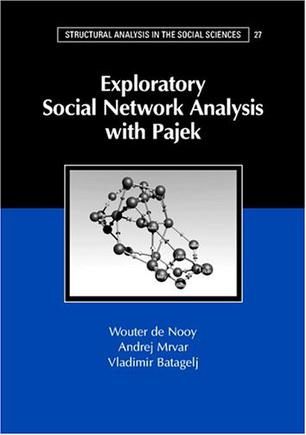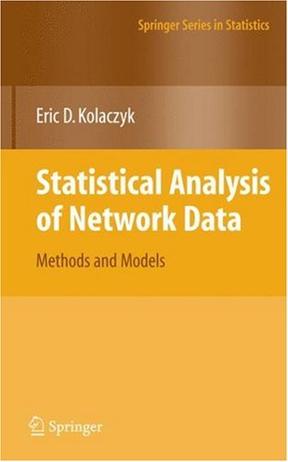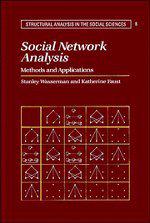-

Exploratory Social Network Analysis with Pajek
This is the first textbook on social network analysis integrating theory, applications, and professional software for performing network analysis (Pajek). Pajek software and datasets for all examples are freely available, so the reader can learn network analysis by doing it. In addition, each chapter offers case studies for practicing network analysis. The book will enable the reader to gain the knowledge, skills, and tools to apply social network analysis in all social sciences, ranging from anthropology and sociology to business administration and history. ======== Table of contents Part I. Fundamentals 1. Looking for social structure 2. Attributes and relations Part II. Cohesion 3. Cohesive subgroups 4. Sentiments and friendship 5. Affiliations Part III. Brokerage 6. Center and periphery 7. Brokers and bridges 8. Diffusion Part IV. Ranking 9. Prestige 10. Ranking 11. Genealogies and citations Part V. Roles 12. Blockmodels Appendix 1. Getting started with Pajek Appendix 2. Exporting visualizations Appendix 3. Shortcur Key Combinations -

Statistical Analysis of Network Data
In the past decade, the study of networks has increased dramatically. Researchers from across the sciences—including biology and bioinformatics, computer science, economics, engineering, mathematics, physics, sociology, and statistics—are more and more involved with the collection and statistical analysis of network-indexed data. As a result, statistical methods and models are being developed in this area at a furious pace, with contributions coming from a wide spectrum of disciplines. This book provides an up-to-date treatment of the foundations common to the statistical analysis of network data across the disciplines. The material is organized according to a statistical taxonomy, although the presentation entails a conscious balance of concepts versus mathematics. In addition, the examples—including extended cases studies—are drawn widely from the literature. This book should be of substantial interest both to statisticians and to anyone else working in the area of ‘network science.’ The coverage of topics in this book is broad, but unfolds in a systematic manner, moving from descriptive (or exploratory) methods, to sampling, to modeling and inference. Specific topics include network mapping, characterization of network structure, network sampling, and the modeling, inference, and prediction of networks, network processes, and network flows. This book is the first such resource to present material on all of these core topics in one place. -

Social Network Analysis
Social network analysis is used widely in the social and behavioral sciences, as well as in economics, marketing, and industrial engineering. The social network perspective focuses on relationships among social entities and is an important addition to standard social and behavioral research, which is primarily concerned with attributes of the social units. Social Network Analysis: Methods and Applications reviews and discusses methods for the analysis of social networks with a focus on applications of these methods to many substantive examples. It is a reference book that can be used by those who want a comprehensive review of network methods, or by researchers who have gathered network data and want to find the most appropriate method by which to analyze it. It is also intended for use as a textbook as it is the first book to provide comprehensive coverage of the methodology and applications of the field.